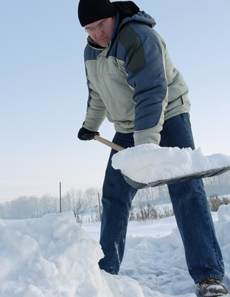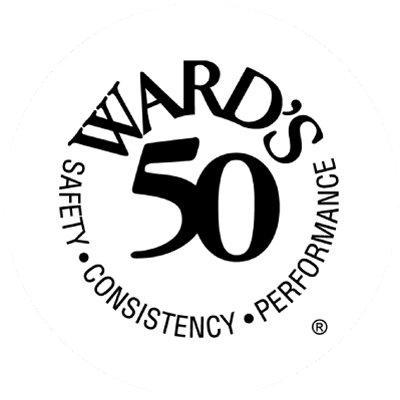General Tips for Safe Snow Clearing
- Check with your doctor. Because this activity places high stress on the heart, you should always speak with your doctor before shoveling or snow blowing. If you have a medical condition or do not exercise regularly, consider hiring someone to remove the snow.
- Dress appropriately. Light, layered, water-repellent clothing provides both ventilation and insulation. It is also important to wear the appropriate head coverings, as well as mittens or gloves and thick, warm socks. Avoid falls by wearing shoes or boots that have slip-resistant soles.
- Start early. Try to clear snow early and often. Begin shoveling/snow blowing when a light covering of snow is on the ground to avoid dealing with packed, heavy snow.
- Clear vision. Be sure you can see what you are shoveling/snow blowing. Do not let a hat or scarf block your vision. Watch for ice patches and uneven surfaces.
 Tips for Snow Shoveling
Tips for Snow Shoveling
- Warm-up your muscles. Shoveling can be a vigorous activity. Before you begin this physical workout, warm-up your muscles for 10 minutes with light exercise.
- Pace yourself. Snow shoveling and snow blowing are aerobic activities. Take frequent breaks and prevent dehydration by drinking plenty of fluids. If you experience chest pain, shortness of breath, or other signs of a heart attack, stop the activity and seek emergency care.
- Proper equipment. Use a shovel that is comfortable for your height and strength. Do not use a shovel that is too heavy or too long for you. Space your hands on the tool grip to increase your leverage.
- Proper lifting. Try to push the snow instead of lifting it. If you must lift, do it properly. Squat with your legs apart, knees bent, and back straight. Lift with your legs. Do not bend at the waist. Scoop small amounts of snow into the shovel and walk to where you want to dump it. Holding a shovelful of snow with your arms outstretched puts too much weight on your spine. Never remove deep snow all at once. Do it in pieces.
- Safe technique. Do not throw the snow over your shoulder or to the side. This requires a twisting motion that stresses your back.
Tips for Snowblowing
- Never stick your hands in the snowblower! If snow jams the snowblower, stop the engine and wait more than 5 seconds. Use a solid object to clear wet snow or debris from the chute. Beware of the recoil of the motor and blades after the machine has been turned off.
- Proper supervision. Do not leave the snow blower unattended when it is running. Shut off the engine if you must walk away from the machine.
- Safe fueling. Add fuel before starting the snow blower. Never add fuel when the engine is running or hot. Do not operate the machine in an enclosed area.
- Avoid the engine. Stay away from the engine. It can become very hot and burn unprotected flesh.
- Watch the snowblower cord. If you are operating an electric snow blower, be aware of where the power cord is at all times.
- No tampering. Do not remove safety devices, shields, or guards on switches, and keep hands and feet away from moving parts.
- Watch for motor recoil. Beware of the brief recoil of motor and blades that occurs after the machine has been turned off.
- Keep children away. Never let children operate snowblowers. Keep children 15 years of age and younger away when snowblowers are in use.
- Understand your machine. Read the instruction manual prior to using a snowblower. Be familiar with the specific safety hazards and unfamiliar features. Do not attempt to repair or maintain the snowblower without reading the instruction manual.
| The above is an excerpt from the article, “Prevent Snow Shoveling and Snow Blowing Injuries.” For more information, please visit www.orthoinfo.aaos.org. |


